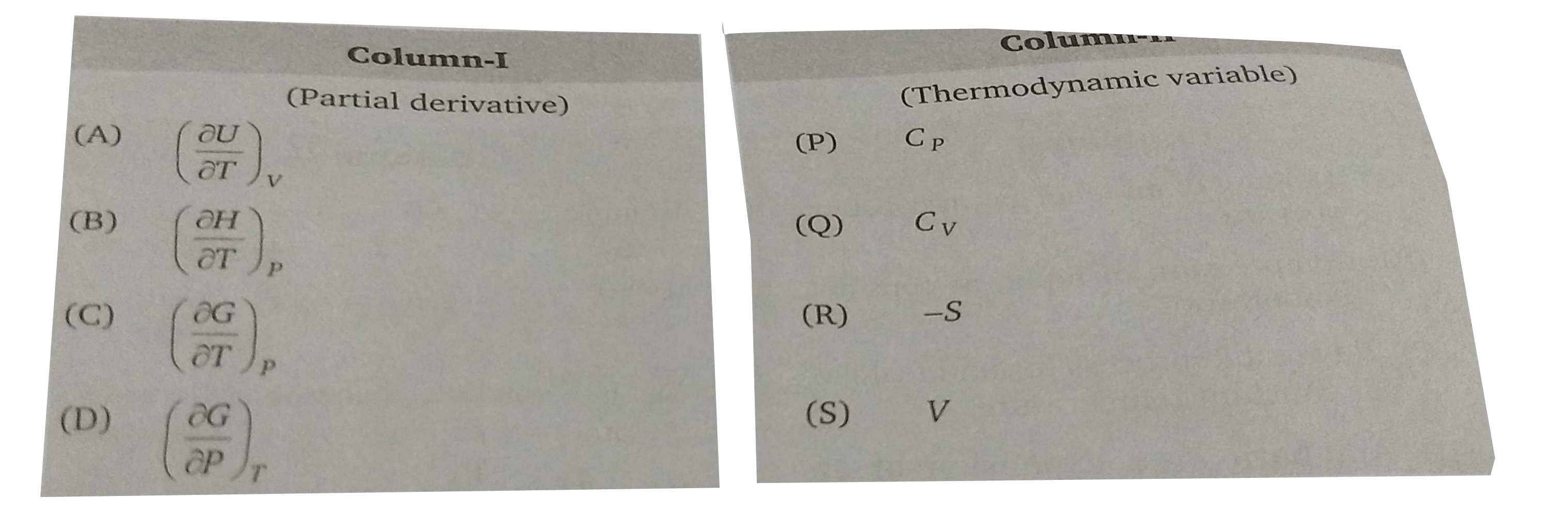Use the given standard enthalpies of formation (in kJ/mol) to determine the enthalpy of reaction of the following reaction :
NH3(g)+3F2(g)→NF3+3HF(g)
ΔH∘f(NH3)(g)=−46.2,
ΔH∘f(NF3)(g)=−113.0
ΔH∘f(HF)(g)=−269.0Solution in Punjabi
−335.8kJ/mol
−873.8kJ/mol
−697.2kJ/mol
−890.4kJ/mol
The correct Answer is:B
ΔrH=(ΔfH)P−(ΔfH)R
ΔrH=−113+3×(−269)+46.2=−873.8 kJ
Topper's Solved these Questions
- BOOK - NARENDRA AWASTHICHAPTER - THERMODYNAMICSEXERCISE - Level 3 - One Or More Answers Are Correct1videos
THERMODYNAMICS
- BOOK - NARENDRA AWASTHICHAPTER - THERMODYNAMICSEXERCISE - Level 3 - Match The Column2videos
THERMODYNAMICS
- BOOK - NARENDRA AWASTHICHAPTER - THERMODYNAMICSEXERCISE - Level 2 (Q.1 To Q.30)1videos
THERMODYNAMICS
- BOOK - NARENDRA AWASTHICHAPTER - STOICHIOMETRYEXERCISE - Level 3 - Subjective Problems20videos
STOICHIOMETRY
Similar Questions
Assume ideal gas behaviour for all the gases considered and neglect vibrational degrees of freedom. Separate equimolar sample. Separate equimolar samples of Ne, O2 , CO2 and SO2 were subjected to a two process as mentioned. Initially all are at same state of temperature and pressue.
Step I → All undergo reversible adiabatic expansion to attain same final volume, which is double the original volume thereby causing the decreases in their temperature.
Step → After step I all are given appropriate amount of heat isochorically to restore the original temperature.
Mark the correct option(s) :02:22View SolutionMatch the following columns
 07:26View Solution
07:26View SolutionWrite structure of 2,2-dimethylheptane.
03:13View SolutionWhat volume of a liquid (in L) will contain 10 mole ? If molar mass of liquid is 280 and its density is 1.4 g/mL.
04:02View SolutionThe enthalpy change (Delta H) for the reaction N_(2) (g) + 3 H_(2) (g) rarr 2 NH_(3) (g) is - 92.38 kJ at 298 K . The internal energy change Delta U at 298 K is
04:25View SolutionDetermine the enthalpy change of the reaction. C3H5(g)+H2(g)→C2H6(g)+CH4(g) at 25∘C, using the given heat of combustion value under standard conditions: Compound H2(g)CH4(g)C2H6(g)C (graphite)
ΔH∘(kJ/mol)−285.8=890.0−1560.0−393.5 The standard heat of formation of C3H8(g) is −103.8kJ/mol01:44View SolutionUse the given standard enthalpies of formation (in kJ/mol) to determine the enthalpy of reaction of the following reaction : NH_(3)(g)+3F_(2)(g)rarrNF_(3)+3HF(g) DeltaH_(f)^(@)(NH_(3),g)=-46.2, " "DeltaH_(f)^(@)(NF_(3),g)=-113.0 ," "DeltaH_(f)^(@)(HF, g)=-269.0
02:45View SolutionDetermine the enthalpy of formation of B_(2)H_(6) (g) in kJ/mol of the following reaction : B_(2)H_(6)(g)+3O_(2)(g)rarrB_(2)O_(3)(s)+3H_(2)O(g) , Given : Delta_(r )H^(@)=-1941 " kJ"//"mol", " "DeltaH_(f)^(@)(B_(2)O_(3),s)=-1273" kJ"//"mol," DeltaH_(f)^(@)(H_(2)O,g)=-241.8 " kJ"//"mol"
02:15View SolutionGiven : (i) NH_(3) (g) + 3Cl_(2)(g) rarr NCl_(3)(g)+3HCl(g) , Delta H_(1) (ii) N_(2)(g) + 3H_(2)(g) rarr 2NH_(3)(g) , Delta H_(2) (iii) H_(2)(g)+Cl_(2)(g) rarr2HCl(g) , Delta H_(3) Express the enthalpy of formation of NCl_(3)(g)(Delta H_(f)) in terms of DeltaH_(1), Delta H_(2) and Delta H_(3) :
View SolutionThe standard enthalpy of formation of ammonia gas is
Given: N2H4(g)+H2(g)→2NH3(g),ΔH∘r=−40kJ/mol
ΔH∘f[N2H4(g)]=−120kJ/mol04:37View SolutionFor the reaction
3N2O(g)+2NH3(g)→4N2(g)+3H2O(g),ΔH∘=−879.6kJ
If ΔH∘f[NH3(g)]=−45.9kJ mol−1,
ΔH∘f[H2O(g)]=−241.8kJ mol−1
Then ΔH∘f[N2O(g)] will be:02:08View SolutionCalculate the enthalpy of reaction (Delta H ^(@)) when ammonia is oxidized : 4NH_(3) (g) + 5O_(2)(g) rarr 6H_(2)O(g) + 4NO(g) Standard enthalpies of formation (Delta_(f) H^(@)) at 25^(@)C for NH_(3)(g),H_(2)O(g) and NO(g) are - 46.2, -241.8 and + 90.4 kJ // mole respectively.
02:12View SolutionDetermine the standard enthlpy of the reaction C_(3)H_(8)(g) + H_(2)(g) to C_(2)H_(6)(g) + CH_(4)(g) . Using the given enthalpies under standard conditions. Compound H_(2)(g)CH_(4)(g)C_(2)H_(6)(g)C("Graphite") Delta_(c)H^(0)(kJ//mol) –285.8 – 890.0 – 1560. 0 –395.5 The standard enthalpy of formation of C_(3)H_(8)(g) is –103.8 kJ//mol
02:12View SolutionCalculate ΔH∘f for the reaction CO2(g)+H2(g)→CO(g)+H2O(g) given that ΔH0f for CO2(g),CO(g) and H2O(g) are -393.5 , -111.31 and −242kJ mol−1 respectively.
01:59View SolutionFor the reaction PCI _(3) (g) + CI_(2)(g) rightarrow PCI_(5)(g), Delta H = -x kJ If the Delta H_(f)^(@)"PCI"_(3) is -y kJ, what is Delta H_(f)^(@)PCI_(5) ?
01:42View SolutionThe enthalpy of formation of NH3 is −46kJ/mol The enthalpy change for reaction :
2NH3(g)→N2(g)+3H2(g) is :02:10View Solution

